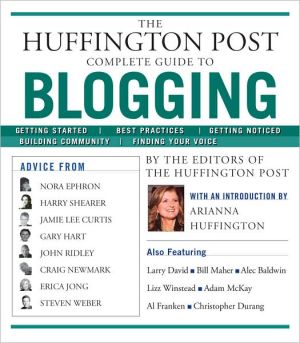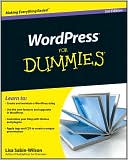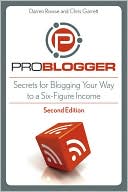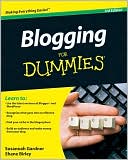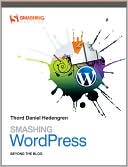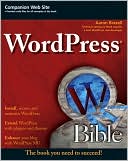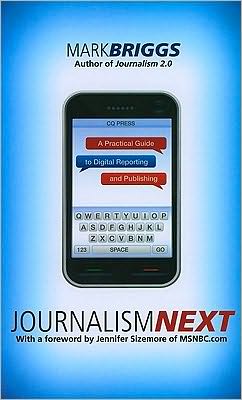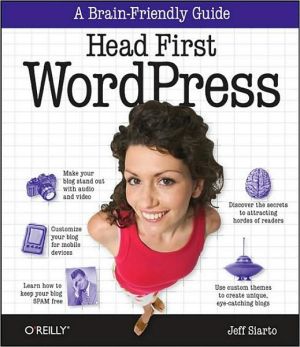Huffington Post Complete Guide to Blogging
The editors of The Huffington Post — the most linked-to blog on the web — offer an A-Z guide to all things blog, with information for everyone from the tech-challenged newbie looking to get a handle on this new way of communicating to the experienced blogger looking to break through the clutter of the Internet. With an introduction by Arianna Huffington, the site's cofounder and editor in chief, this book is everything you want to know about blogging, but didn't know who to ask.\ As...
Search in google:
The editors of The Huffington Post — the most linked-to blog on the web — offer an A-Z guide to all things blog, with information for everyone from the tech-challenged newbie looking to get a handle on this new way of communicating to the experienced blogger looking to break through the clutter of the Internet. With an introduction by Arianna Huffington, the site's cofounder and editor in chief, this book is everything you want to know about blogging, but didn't know who to ask.As entertaining as it is informative, The Huffington Post Complete Guide to Blogging will show you what to do to get your blog started. You'll find tools to help you build your blog, strategies to create your community, tips on finding your voice, and entertaining anecdotes from HuffPost bloggers that will make you wonder what took you so long to blog in the first place.The Guide also includes choice selections from HuffPost's wide-ranging mix of top-notch bloggers. Among those who have blogged on HuffPost are Barack Obama, Hillary Clinton, Larry David, Jane Smiley, Bill Maher, Nora Ephron, Jon Robin Baitz, Steve Martin, Lawrence O'Donnell, Ari Emanuel, Mia Farrow, Al Franken, Gary Hart, Barbara Ehrenreich, Edward Kennedy, Harry Shearer, Nancy Pelosi, Adam McKay, John Ridley, and Alec Baldwin.
CHAPTER 1\ Welcome to the World of Blogs\ \ Blogging is the only addiction that won't make you fat, drunk or stoned. But it might make you so hungry for instant gratification that your books get shorter.\ — Erica Jong, novelist, HuffPost blogger\ \ Yes, yes, we get the irony. We're writing a book about blogs. Where is the comments section? Where are the links? By the time you're thumbing through this at the bookstore several months will have transpired since we wrote these words. With no comments from readers. Or updates.\ But believe it or not, a book about blogging fits neatly into this juncture in communication history. You see, printed books themselves were once a rather revolutionary idea. Six hundred years ago, if people wanted to share ideas, they had few options. We could shout our complaints from the barn rafters. Maybe a few chickens would hear us. We could scrawl or draw our musings and post them in the town square — but soon the elements would take their toll. Documents were preserved, of course — medieval monks specialized in hand-copying important texts — but to justify years of a monk's time, these documents had to be privileged indeed. Few normal people could spare five years to hand-write their stories.\ Then, in mid-fifteenth-century Germany, printer Johannes Gutenberg happened upon a discovery: By creating type pieces out of metal — known as movable type — and arranging them to form words, you could make multiple copies of a document far faster than a monk could write. Gutenberg's most famous creation was the Gutenberg Bible, but before long, people were using movable type to print science books, political commentaries, and other works that fundamentally changed the world.\ Fast-forward to 2001. Somewhere in California, a twenty-something woman named Mena Trott, laid off from her dot-com job, started keeping an online diary of her life. She called it Dollar Short (as in a day late and a...). She wasn't happy with the available online publishing tools. So she and her husband, Ben, decided to create their own. On October 8, 2001, they released their contribution to the nascent blogging software industry. You could download it free of charge (though donations to the Trott rent fund were certainly welcome). With a wink at the past, they called the software Movable Type.\ So there you have the blog/book connection: from movable type, to books, to books on Movable Type. Is blogging as big a revolution as what Gutenberg started? Only time will tell. But since we at The Huffington Post like to report on news and history in the making, we'd like to help you, dear reader, get started on making some history of your own.\ What Is a Blog?\ A blog at its most fundamental level is simply a "web log." That is, a regularly updated account of events or ideas posted on the web.\ But calling blogs mere updated web diaries is a bit like calling poetry a pleasant arrangement of words on a page. There is an art to this. Those of us who work at HuffPost believe we are fortunate enough to be present at the advent of a new form of human communication — one that is more interactive, more democratic, and just more fun than what has come before.\ Blogs can bring down a Senate majority leader. They can show what a presidential candidate talks about in unguarded moments. They can provide stay-at-home parents with a little space to rant about the tragedy of colic (or maybe share updates on a local environmental issue — and Brad Pitt — during naps). They cut out the gatekeepers of information and shorten the news cycle. They give companies new ways to communicate with customers and shareholders — and give customers and shareholders new ways to make their voices heard. Blogging gives you a feeling of satisfaction that writing a letter to the editor, or a letter to the "customer care" department of a corporation, cannot match. The public nature of blogs means that any of the billion people on this planet who own or have access to a computer can read what any of the rest of us is saying. That's true even if what we're saying is about a niche (for instance, issues germane to the mini off-road buggy community) that in the past would have gotten us labeled as freaks. In fact, because the potential audience is so huge, there is space for just about every topic you can imagine. As we link to each other, the marketplace of ideas sorts out who is worth listening to and who is not. A congressman's statement on an issue does not necessarily take precedence over a constituent's, the way it often does in a traditional news story.\ It is this mix of the high and low, the personal and the political, that makes blogs so fascinating and so important in an open society. When we launched HuffPost in 2005, we knew we liked blogs, but even we underestimated how head over heels we'd fall. "Blogging is definitely the most interesting thing I've done as a writer, and I've been writing full-time since the late seventies," Carol Felsenthal, author of Clinton in Exile: A President Out of the White House and a HuffPost blogger, tells us. "I used to walk my dog, Henry, first thing in the morning. Now I'm often at my computer writing a post while Henry looks at me and wonders what happened to the good old days when his owner was compulsive but not hyper-compulsive."\ It's the informality and the immediacy that make blogging addictive for many of us. No editor stands between us and the public. This leads to a lot of rumors and other fluff going up on the web. But it's also enormously liberating. You can put all kinds of ideas out there. "My thoughts don't all have to be fully baked," says Marci Alboher, who writes the "Shifting Careers" column and blog for The New York Times. She posts an idea and sees what her readers think. "They help me solve the problem and let me know if I'm going down the right path. It helps me figure out what the issues are very quickly."\ It is this multidirectional conversation — giving all of us a platform, expanding the scope of news, and making it a shared enterprise between producers and consumers — that makes blogs so revolutionary. We have a lot of fun blogging. We're writing this book because we're pretty sure you will too.\ The History of Blogs\ For all that blogging is changing society, it's important to remember just how new it is. Remember Elián González, the Cuban boy that the entire country was obsessed with in the spring of 2000? His story had the markings of a blogosphere sensation: memorable photos, passionate opinions on U.S./Cuban policy, a political hot potato for the Clinton administration. But it was only a mainstream media mainstay because the blogosphere as we know it today had not yet evolved. The linking, commenting, and annotating we find commonplace today was still to come.\ The term "weblog" was coined in 1997 by Jorn Barger, the editor of Robot Wisdom (itself a blog, albeit one with some nasty anti-Semitism bopping around on it, so we don't recommend you humor him by visiting the site). The shortened word "blog" was coined by Adaptive Path founder and former Epinions.com creative director Peter Merholz on his website (peterme.com) in 1999.\ The number of blogs was small at first. According to Technorati (a company that conducts a sort of blogging census), the one millionth blog came online in the fall of 2003. At that time, people were creating blogs at a rate of about five thousand to six thousand per day. But the rate soon picked up. The blog total hit four million in the fall of 2004, around the time that blogs really exploded on the national radar screen for their role in the flap about memos related to President Bush's National Guard service. By that time, twelve thousand new blogs were coming online each day. Like a colony of bacteria, the blogosphere continued to post a quick doubling rate through 2005 (fourteen million blogs in August) and 2006 (fifty-seven million blogs in October). These days, Technorati is tracking 112 million blogs. Web users create approximately fifty thousand new blogs a day. This being the web, about three to seven thousand of these new blogs are nothing but spam, spam, and links to more spam. The rate of doubling has slowed as the blogosphere has matured. But new voices are still coming online in droves.\ The demographics of the blogosphere could be the subject of several blog posts in their own right. For instance, in late 2006, the most common language for blogs was actually not English.\ According to Technorati, it was Japanese (37 percent). English (at the time) was a close second at 36 percent. About 8 percent of blog posts are in Chinese and 1 percent is written in Farsi (the language spoken in Iran and some of the former Soviet republics). According to a 2006 survey from the Pew Internet and American Life Project, more than half of American bloggers (54 percent) are under age thirty. Both men and women blog at equal rates, but bloggers are less likely to be white (60 percent) than other Internet users (74 percent) and more likely to be Hispanic (19 percent vs. 11 percent).\ The majority of the 112 million blogs out there will never grab more than a few readers. That's OK; 37 percent of bloggers told the Pew survey that keeping in touch with friends and family was a major reason for blogging, and 52 percent said they blogged mostly for themselves rather than for an audience. On the other hand, the most popular blogs — Boing Boing, Engadget, Gizmodo, TechCrunch, and HuffPost — get millions of unique visitors every month.\ Anytime you get lots of eyeballs in one place, there is money to be made. According to a 2008 report from the firm eMarketer, advertising spending on blogs reached $283 million in 2007. The company projected this would rise to $746 million in 2012. For comparison, companies, politicians, and others spend over $70 billion on TV advertising each year and $40 billion on newspaper advertising. We don't think these industries are going to disappear. Nonetheless, as mediums converge, and as online properties allow for better advertisement targeting, blogs offer one of the few revenue growth spots in the media world. Newspaper ad revenue fell 12 percent last year. Even the best newspapers are slashing newsroom jobs.\ Why Blog?\ \ I blog because I am.\ — Cali Williams Yost, Work + Life Fit blog, blogger for Fast Company\ \ Why blog? Here's a better question: Why not blog? As you'll learn in the upcoming chapters, blogging is easier than smoking, can take less time and money, and isn't banned in restaurants. According to the 2006 Pew survey, 59 percent of active bloggers spend just one to two hours a week on their hobby. Unlike smoking, you can also quit whenever you want. Many people do just that. There may be 112 million blogs in the blogosphere, but only 7.4 million, Technorati tells us, have been updated in the last ninety days.\ Fair enough, you say. But what do I write about? We'll cover this more in depth in chapter 2, "Getting Started," but in the meantime, here's some great advice from Penelope Trunk, a blogger and Boston Globe career columnist: "Pick a topic — you can change it when you know what you're doing. This is like dating. Pick something that seems good, and if it isn't, try again. Don't get hung up on topic. As in dating, you'll know when you've found one that's the right fit. There are some obvious things, like pick a topic you have a lot to say about, pick something that interests you, pick something that will help your career. This is great advice, but you already know that if you look for a perfect match you'll never actually go on a date." Here's another reason to blog: Even if quit rates are high, with 2.13 million blog posts going up in the past seven days, chances are you know a lot of people who are blogging. Your colleagues may be blogging when they're "forgetting" to read your sales report. Your neighbors may be blogging instead of bringing in those unsightly trash cans from the curb. The old guy next door who spends a long time lingering at the window in his underwear? He's definitely blogging. Your children are blogging. In fact, they're probably blogging right now about your lame attempts to lose weight by drinking low-carb beer. We wouldn't rule out commentary from your spouse on your Cheez Whiz-for-breakfast habit either. So isn't it time you had your say?\ More seriously, though, we find blogging to be a great opportunity for creative expression, whether you have many outlets or none at all. Nora Ephron — who has multiple ways of expressing herself through books, movies, columns, and the like — has said she loves the unique expression blogs allow. She's not the only ones who feels this way. According to the Pew survey, 52 percent of bloggers said that expressing themselves creatively was a major reason for blogging, and 54 percent said they had never published their writings or media creations elsewhere.\ The main reason to blog is that you have something to say to the world — and you want to see what the world has to say back.\ Why Do You Blog?\ To Avoid the Loony Bin\ \ Bob Cesca, author of One Nation Under Fear and HuffPost blogger\ "If I hadn't discovered blogging during the Bush years, I probably would be in a padded room somewhere. To that point, the most satisfying reason why I blog is that it's a form of catharsis — being able to respond to politicians and the corporate media without having to be employed by either, and while not necessarily having to walk a picket line."\ \ To Fight Injustice\ \ Leslie Goldman, author of Locker Rom Diaries and HuffPost blogger\ "A snarky blog I wrote for HuffPost about a female-only BA degree in homemaking [at Southwestern Baptist Theological Seminary] attracted a producer from CNN. The next thing I knew, I was squaring off, live, against the dean of the university. I'm a body image writer but the topic irked so many of my feminist notions that it didn't matter that my background wasn't in education or gender studies; my passion shined through and I took that dean down!"\ \ As a Substitute for Therapy\ \ Bree Barton, Dante, Degreed blog, and blogger for Cape Cod Today\ "My blog was also a way for me to cope with the existential crisis of being a college graduate. Those first few months weren't pretty; I'm not sure I've ever felt so lost. The post-college world is a bit of a wasteland. Since I'd always been a school addict, graduating really threw me for a loop. My blog offered an opportunity to process my experiences by writing about them. I had excellent fodder for my first entry: I had just been to a temp agency, a truly horrifying experience and the quintessential post-commencement moment. Blogging allowed me a chance to reflect and see the humor in my angst. It also helped keep me sane when I very seriously considered gnawing my fingers off (or going to grad school, a close second)."\ \ To Know You're Not Alone\ \ Jeremy Adam Smith, Daddy Dialectic blog\ "When I became the primary caregiver for my son, I found it to be really emotionally challenging, and I wanted to write about that as a way of trying to understand how I was changing. I couldn't relate at all to the parenting magazines out there, but one day I did a Google search for 'stay at home dad' and discovered this world of dad blogs, as well as smart, progressive mom blogs. I saw my life reflected in those, and I learned a lot. It took about a week for me to realize that I could start my own blog without too much trouble.\ "I tried to write when I got the time, in early-morning or late-night snatches. I discovered that blogging is really an ideal vehicle for writing when you're being constantly interrupted by a crying baby. My posts are still just a series of rough drafts; I think of the blog as a notebook. I've since turned many posts into magazine articles or integrated their ideas and information into my book [Twenty-First-Century Dad: How Stay-at-Home Fathers (and Breadwinning Moms) are Transforming the American Family, Beacon Press, spring 2009]. In the blog I try to be aggressive and adventurous and experimental. As a result, sometimes I am just wrong or offbeat, but I really try to listen to my readers' feedback. Some comments on the blog changed my ideas, or pointed me in new directions, or helped me to understand my life as a father better. I'm very grateful to my readers."\ \ To Tap the Creative Inner Spirit\ \ Jamie Lee Curtis, actress and HuffPost blogger\ "I like blogging. The first time I blogged, like the first time I wrote a book, I didn't know I was doing it. I was just expressing an idea, an idea that wasn't even formed until it made it on paper. No edit. No 'What does/will this mean?' Just an idea. The individual roving mind of a woman. My mind. Something had happened in the world, it had been presented in the press, and I had a very strong feeling about it. I like that a blog gives the blogger a chance at expression without a publishing deal or a marketing plan and an eleven-city tour. I like that it goes out fast and becomes part of a larger dialogue and discourse. I like how the comments go down their own paths, tangents being commented on that really have no relevance to the original idea, just the free, roving minds of a populace, churning out ideas and more ideas.\ "John Steinbeck in East of Eden wrote:\ \ Our species is the only creative species, and it has only one creative instrument, the individual mind and spirit of a man. Nothing was ever created by two men. There are no good collaborations, whether in music, in art, in poetry, in mathematics, in philosophy. Once the miracle of creation has taken place, the group can build and extend it, but the group never invents anything. The preciousness lies in the lonely mind of a man. And now the forces marshaled around the concept of the group have declared a war of extermination on that preciousness, the mind of man. By disparagement, by starvation, by repressions, forced direction, and the stunning hammerblows of conditioning, the free, roving mind is being pursued, roped, blunted, drugged. It is a sad suicidal course our species seems to have taken. And this I believe: that the free, exploring mind of the individual human is the most valuable thing in the world. And this I would fight for: the freedom of the mind to take any direction it wishes, undirected. And this I must fight against: any idea, religion, or government which limits or destroys the individual. This is what I am and what I am about. I can understand why a system built on a pattern must try to destroy the free mind, for that is the one thing which can by inspection destroy such a system.\ \ "I second that. That is what I think blogging does: allows the individual minds of men and women to explore the limitlessness of their vast potential. I think we as a species are on a suicidal course, wanting more, having more, feeding ourselves and our children on ephemeral pleasures and poisons. Blogging allows contrary ideas into the societal vein and maybe, just maybe these ideas will be absorbed by the next generations who are the ones that will have to make the change that we need to survive."\ \ What This Book Will Cover\ Blogging is like the game Othello: It takes a minute to learn and a lifetime to master. If you're a newbie, we hope this book will give you the confidence you need to get started, or to move your blog to "active" status. If you're an experienced blogger and want to blog better, we will show you how.\ The first section shows you how to start. We start with a very basic question: What should your blog be about? Then we cover the technical side: different blog hosts (Blogger, TypePad, LiveJournal, etc.) and the pros and cons of each. For the advanced set, we look at podcasting, video blogs (or "vlogs"), tumblelogs, and other variations on the theme.\ Then we'll look at some blogging best practices. What kind of template works best? (Please, no black background and teal text. We're begging you.) How do you choose good titles? You can customize your posts with photos and other art items that will draw readers in. We'll teach you how to write a bio that intrigues people and makes them want to listen to you. We'll teach you how to create a blogroll — that is, links to other blogs that cover complementary topics and whose creators might also link to you. We'll complete this section with a primer on linking to other web pages within your blog posts, using pull quotes, and the ever-important ethical and legal question of what constitutes fair use of copyrighted materials.\ Once you have a blog, you want the world to know about it. We'll cover how to measure traffic using Site Meter, StatCounter, or Google Analytics. We'll show you how to figure out if other bloggers are mentioning you and how to draw more readers in. You'll learn how to build buzz for your site with Yahoo! Buzz, Digg, Delicious, and other tools. We'll include tips from people who work in public relations and bloggers who have managed to get their musings mentioned in all sorts of media outlets.\ If you'd like to try to make some money with your blog, be sure to check out the section on using Google AdSense, Amazon Associates, and Yahoo! Publisher Network, as well as some other blog business models.\ After you've got the nuts and bolts down, it's time to master the form. In chapter 4, we'll talk about finding your voice. Don't worry if you didn't get the best grades in English class as a kid or if your term papers came home bleeding red ink. Anyone can learn to write better, and even good writers may need some help learning the tools and tricks of the blogging trade. In general, a good blogger has a strong voice, a unique writing style, and a passion for what she's covering. She knows her audience well and aims to be part of the conversation with other bloggers in her community. She goes where the mainstream media doesn't. We'll show you the difference between how the mainstream media might cover an event and how a blogger would.\ A key difference between mainstream journalism and the blogosphere (the community of bloggers on the web) is that blogs are just that: a community. In chapter 5 we'll talk about building a community around your blog. At HuffPost, we're fortunate to have two-thousand-plus bloggers and millions of readers conversing, boisterously, around the clock. In the old days, when a newspaper arrived on your doorstep (and it still does for many of us here at HuffPost), if a columnist ticked you off, all you could do was yell, nutcase-style, at the editorial page. (OK, you could also line your birdcage with it. But the columnist didn't know you were doing this.) On HuffPost, our bloggers often check back multiple times a day to see what their readers think. They engage with them. This chapter will talk about how to encourage comments, how to take criticism, how to be a good member of the blog community, and how to deal with the occasional cranks whose inappropriate posts scare off other readers.\ Over the last few years, HuffPost has learned a lot about breaking news and building a community. So in the second section of this book, we'll share our story and the stories of some other blogs that have reshaped the media (and communication more generally). We're proud to have been part of this revolution. You'll hear about blogging successes, such as how our own Mayhill Fowler broke the story about Senator Barack Obama referring to small-town voters as "bitter."\ Broadly, we believe that the cause of democracy is served by having more information out there. We believe that democracy is advanced by having more voices included in the conversation. When everyone is a journalist, everyone can serve the journalist's role of keeping watch on our leaders and sharing stories that outrage or inspire. Blogging also teaches us that we all have the power to determine what is news. For you, your child's first steps may be as much a part of your news as an election. People have talked a lot about blogs, but this fundamentally democratic aspect of them is just beginning to be understood.\ We are also just beginning to understand how blogs can bring us together. In 2000, the sociologist Robert Putnam wrote a book about the decline of American community called Bowling Alone: The Collapse and Revival of American Community. He fretted that Americans were no longer joining Rotary clubs and volunteer groups, or even having friends over for dinner. He worried that we were destroying our social capital and becoming increasingly lonely. But the truth is that communities haven't disappeared (something Putnam acknowledged by including Craigslist as an example of a modern-day civic society in his 2003 book Better Together: Restoring the American Community). They've just changed. Now, bowling enthusiasts can read blogs written by bowlers in different time zones and comment on someone's unanticipated fifteen-strike streak. They may never share a bowling alley, but they're creating social networks all the same. Furthermore, these social networks aren't as inhibited by our in‑person tendencies to meet up with folks of the same race, gender, age, sexual orientation, and disability status. We judge fellow bloggers on their ideas and their wit. Personally, we think that's a much better way to choose compatriots for this raucous RSS (Really Simple Syndication — but more on that later) feed called life. And who knows, maybe someone you meet through blogging will turn out to be a face-to-face neighbor as well. Copyright © 2008 by the Huffington Post
Foreword by Kenneth LererIntroduction by Arianna Huffington Part IThe Nuts and Bolts of BloggingChapter 1 Welcome to the World of Blogs Chapter 2 Getting Startedâ??â??Chapter 3 Getting Noticedâ??Chapter 4 Finding Your VoiceChapter 5 Community: Creating and Building Itâ??Part IIThe Blog Revolution is Here! Be A Part of It.Chapter 6 A Blog is Born: A Brief History of The Huffington Post and Its Impactâ??â??Chapter 7 How the Blogosphere is Remaking the Mediaâ??Part IIIThe Huffington Post Resource SectionThe Huffington Post BlogrollGlossary of Blogging Terms Website Resource Listâ??â??Best of the HuffPost BlogsAcknowledgments
\ From Barnes & NobleIf you want to launch or sharpen your own blog, there's no better way than learning from the best. Arianna Huffington's Huffington Post is the most linked-to blog on the Web and has received rave reviews even from commentators who don't usually agree with its resident bloggers. In this complete guide, readers will learn how to start your blog; how to jump-start your own online community; and how to generate buzz in this competitive digital environment. The Huffington Post Complete Guide to Blogging includes advice from Jamie Lee Curtis, Nora Ephron, Steven Weber, Harry Shearer, and others. A stylish, accessible guide to creating an online presence.\ \
